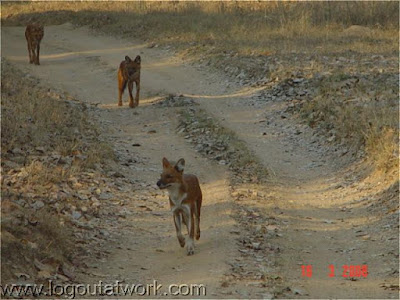Same was the case in my more recent visit in March 2008 – four sightings in three days !
Our first sighting was on the very first evening from a jeep. We heard the alarm calls (sounds made by deers, monkeys, barasingha when they see the tiger), and saw a few jeeps standing little ahead – so we closed in and stopped behind the jeeps. Everyone was busy trying to find the tiger, and make sense of noises made by the other animals. And then the tiger (actually tigress) appeared to our left and cameras on all the jeeps got into action.

The tigress started walking towards the road where the jeeps were lined and crossed the road two jeeps ahead of ours. Every eye (animals and humans present at the site) followed the tigress till she disappeared on our right.

We waited for the other jeeps to move, and our guide told us which way the tigress could have gone. Having reached there we again started looking for the tigress, the driver and the guide giving possible explanation of where she could be. And then someone pointed towards her, she was standing in the grass looking straight at us; reminded me of the saying “For every time that you see a tiger, the tiger sees you thousand times”
It was us and the tigress for next fifteen minutes. She came to cross the road a few meters ahead of where our jeep was, and then decided to take rest.
We got enough pictures of the tigress walking a few meters ahead, then while she went back to the greens we got a chance to move ahead and then got pictures of her walking right behind the jeep.
Earlier in the day, we also got to see some wild dogs.

Kanha is about 1130 kms drive from Mumbai. One can fly into Nagpur (Nagpur to Kanha is about 250 kms) or Jabalpur (Jabalpur to Kanha is about 165 kms) and then hire a vehicle to get to Kanha National Park. There are two main entrance gates to the National Park area – Kisli and Mukki. Most park safaris start at Kisli and majority of the resorts are also located at Khatia outside the Kisli gate; Tuli Tiger Resort (http://www.tuligroup.com/, Tel: +91-712-2534784-88), Kipling Camp and the more recent Celebrations resort are among the popular ones.

Kanha is about 1130 kms drive from Mumbai. One can fly into Nagpur (Nagpur to Kanha is about 250 kms) or Jabalpur (Jabalpur to Kanha is about 165 kms) and then hire a vehicle to get to Kanha National Park. There are two main entrance gates to the National Park area – Kisli and Mukki. Most park safaris start at Kisli and majority of the resorts are also located at Khatia outside the Kisli gate; Tuli Tiger Resort (http://www.tuligroup.com/, Tel: +91-712-2534784-88), Kipling Camp and the more recent Celebrations resort are among the popular ones.
The only option of accommodation available inside the first gate and at the periphery of National Park is Baghira Log Huts (http://www.mptourism.com/dest/kanha.html) run by MP Tourism. If you do choose to stay at Baghira Log Huts, be prepared to see a bison or cheetal and if you are lucky even a tiger right outside your room.
Next morning we decided to take an elephant safari and go searching for a tiger. It took our Mahawat (elephant driver) an hour or so to figure our the approx. location of the tiger.

But we could not find the tiger till we heard a roar and directed the elephant towards it. When we reached – there were not one, but two tigers fighting. The elephant stayed at a safe distance till the two calmed down and sat at some distance from each other.

When we came back we heard of a tiger-show nearby (where-in, an elephant mahawat spots a tiger and informs the co-ordinating unit and then tourist jeeps are sent to the nearest point and tourists taken on elephant from there to see the tiger), so we went and paid our visit to this male tiger as well.

But we could not find the tiger till we heard a roar and directed the elephant towards it. When we reached – there were not one, but two tigers fighting. The elephant stayed at a safe distance till the two calmed down and sat at some distance from each other.

When we came back we heard of a tiger-show nearby (where-in, an elephant mahawat spots a tiger and informs the co-ordinating unit and then tourist jeeps are sent to the nearest point and tourists taken on elephant from there to see the tiger), so we went and paid our visit to this male tiger as well.
In the afternoon we took a jeep safari and saw bisons crossing the road.


Inspired by the previous morning experience, we decided to take the elephant safari again the next morning. We told our Mahawat that we really would like to see a full grown male tiger. He was quick to inform us that there is one male tiger seen around here in last few days so if we were lucky, we could have a good sighting. Soon enough our Mahawat was able to confirm pugmarks of a male tiger and we followed those to the next water body but didn’t find the tiger.
We searched around further and finally did spot the tiger but he was in no mood to sit down. We chased the tiger for next 15-20 minutes, at times fearing we would lose him, before he actually decided to sit down for some time.








